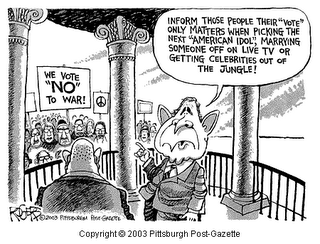 This is first among surely many on TV.
This is first among surely many on TV.David Foster Wallace: "TV is not vulgar and prurient and dumb because the people who compose the audience are vulgar and dumb. Television is the way it is simply because people tend to be extremely similar in their vulgar and prurient and dumb interests and wildly different in their refined and aesthetic and noble interests."
Great thing about democracy is, it leads rulers like George Bush to confuse between "vulgar and prurient and dumb interests" like following those TV programs and "aesthetic and noble interests" like defeating him through ballot box.
No comments:
Post a Comment